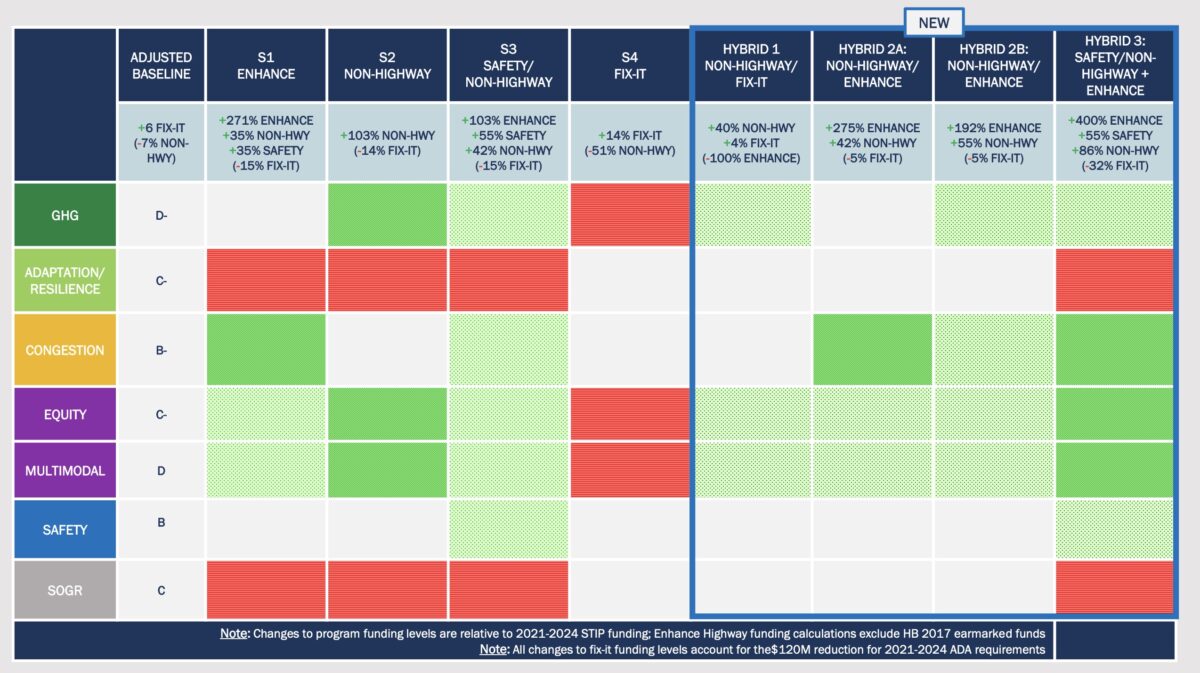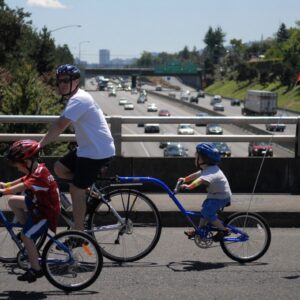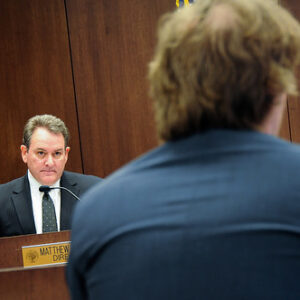
For the past four-and-a-half months the Oregon Department of Transportation has asked the public to help them decide how they should spend $2.2 billion. This crucial exercise is the first step in creation of the 2024-2027 Statewide Transportation Improvement Program (STIP), which is the master list of projects the agency will fund during that three-year period.
Oregonians were asked to consider and comment on four funding scenarios that prioritize different categories of funding. One scenario was tilted toward highway maintenance and repair (what ODOT refers to as “Fix-It” projects), another scenario toward active transportation and transit projects (the “Non-Highway” scenario), and so on. As we reported last week, advocacy groups, government agencies, individuals and organizations across the state did their research and submitted feedback — much of it centered around a particular funding scenario that did the most to reduce greenhouse gas emissions.

The big decision on which scenario would be adopted was scheduled for today (December 1st) at the meeting of the Oregon Transportation Commission (OTC), the unelected, five-member body that oversees ODOT.
That decision didn’t happen because ODOT staff — in direct collaboration with some OTC members including Chair Robert Van Brocklin — cooked up their own scenarios outside the public process. BikePortland learned about these new scenarios only yesterday, and a full analysis on them was not made available to the public until 12:00 noon today — less than one hour before the vote was scheduled on the OTC agenda.
Advertisement
Despite this lack of transparency and having no feedback on these new funding plans, at the outset of today’s meeting ODOT Deputy Director of Revenue and Finance Travis Brouwer actually boasted about the agency’s public input process. “We have gotten a huge amount of public input,” Brouwer said. “Every STIP cycle we ramp up our public input process another notch or two. And this time I think we really did a pretty good darn good job.”
This is a striking statement from someone who not only introduced four brand new complicated funding scenarios at the last second, but who also warned OTC members about risks to the STIP process if today’s vote was put off until their next meeting on January 17th. “One thing I would note is there are costs of [a delay],” Brouwer warned. “We need to start the project scoping process. And if that process is delayed [until your next meeting]… then the amount of time we have to do that is reduced.”
ODOT’s new funding scenarios were initially introduced as two distinct options, but at today’s meeting they introduced two additional variations, expanding the debate to four new scenarios. Then, to further marginalize months of public feedback on the four original scenarios, the OTC opted to dismiss them completely to focus solely on the four new ones.
Advertisement
Thankfully, the OTC leadership of Chair Van Brocklin and Vice Chair Alando Simpson made it clear more time is necessary to consider these new options. They’ve directed ODOT staff to put together more information and analysis the new funding scenarios and the plan is to reconvene for a special meeting to adopt one of them next Thursday.
Stay tuned for a closer look at each of them. I’ll share more details about the upcoming meeting as soon as it becomes available.
— Jonathan Maus: (503) 706-8804, @jonathan_maus on Twitter and jonathan@bikeportland.org
— Get our headlines delivered to your inbox.
— Support this independent community media outlet with a one-time contribution or monthly subscription.







Thanks for reading.
BikePortland has served this community with independent community journalism since 2005. We rely on subscriptions from readers like you to survive. Your financial support is vital in keeping this valuable resource alive and well.
Please subscribe today to strengthen and expand our work.
Scam.
Change is inevitable. Large organizations like ODOT have the choice to be stewards of progressive change or continue to be obstructionist. Looks like they wish to continue on the latter path. This is a futile struggle on their part as Nature will eventually show us all the right path.
ODOT, you can help mitigate the ongoing climate catastrophe or actively fight against progress. For all of our sakes we ask that you choose wisely.
This is outrageous and incredibly disrespectful to every person and organization that spent so much time and energy crafting thoughtful feedback to the original scenarios. I am honestly flabbergasted at ODOT’s naked chicanery, and I feel really depressed, as a citizen, about even taking part in these public comment sessions, when it is apparent that public input — let alone, y’know, overwhelming scientific consensus about climate change!! — is so blatantly disregarded for some predetermined outcome. It just feels like a charade.
Thanks for staying on top of this story, Jonathan.
Why is the “adjusted baseline” to cut 7% from bike, walk and transit funding?! How about an “adjusted baseline” which stops all highway widening projects until we have enough funding for safety and maintenance and fixing the lack of sidewalks, bike infrastructure and bus lanes?